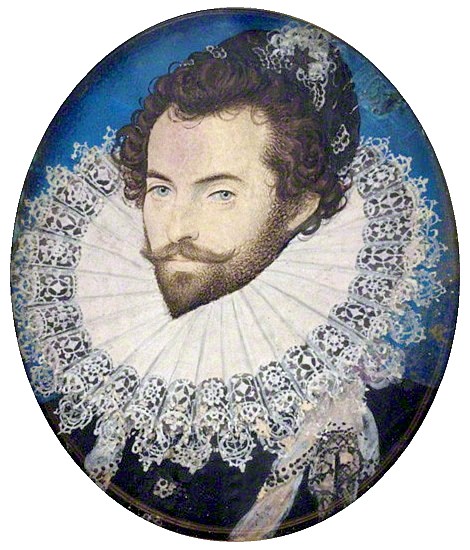| The coast of "Virginia," by John White |
So ... what do we think of, in the context of America, when someone says "Colonial History"? Most of us, I'm sure, think of the War for American Independence, possibly of Daniel Boone, and before that, of the Mayflower, Plymouth Rock, and Jamestown.
Our country's European roots go even further than that, however. Though the period between Columbus and the Mayflower is usually viewed as a misty void, the English quest to colonize the New World was first fueled by Queen Elizabeth I, who sought lands not already claimed by Christian rulers to add to the fame and fortunes of Britain.
 |
| A very dapper Sir Walter Raleigh |
After the 1583 voyage to Newfoundland by Sir Humphrey Gilbert ended in disaster (Gilbert perished at sea on his way home), the patent passed to his younger half brother, Sir Walter Raleigh. Wasting no time, Raleigh sent an expedition to what was then known as Virginia--named after Elizabeth herself, the "Virgin Queen." The first colonist--more a military endeavor than a serious permanent settlement yet--landed on Roanoke Island in 1585, on the Outer Banks of what is now North Carolina. Those original colonists returned to England shortly after, just missing their supply ship. This second wave left a contingent of 15 men to hold the area.
The next serious attempt at colonization took place in 1587, and the group of 117-some included women and children. These brave souls comprised what would later be called "the Lost Colony." A brief introduction to that story was provided by our own Janet Grunst, in her post "America's Oldest Unsolved Mystery."
More on that later, as over the next few months, I'll be looking at some of the key players in these early attempts at colonizing North America. :-)

The Lost Colony on Roanoke Island is a fascinating mystery and an amazing production.
ReplyDeleteIt is! I'm planning to visit late next month but the drama has been canceled this summer due to COVID. :-/ Your post really made me wish it were possible to see it!
DeleteDid you gals ever read Angela Hunt's novel Roanoke? It's been years, but I think I might read it again. Just one take on the mystery, and a captivating story. Looking forward to this series of posts, Shannon.
DeleteI haven't, but thanks for mentioning it, Naomi!
DeleteInteresting read. Thank you for sharing.
ReplyDeleteThank YOU for stopping by! ❤
DeleteIt's a fascinating area. We loved our visit to Manteo and thought the play would be great to see. However, we prefer off-season visits to the OBX! Great post, Shannon!
ReplyDeleteYeah, I'm sure it'll be busy and crowded when we're there! But I'm excited to see the area. I've missed getting to explore the Carolinas!
Delete